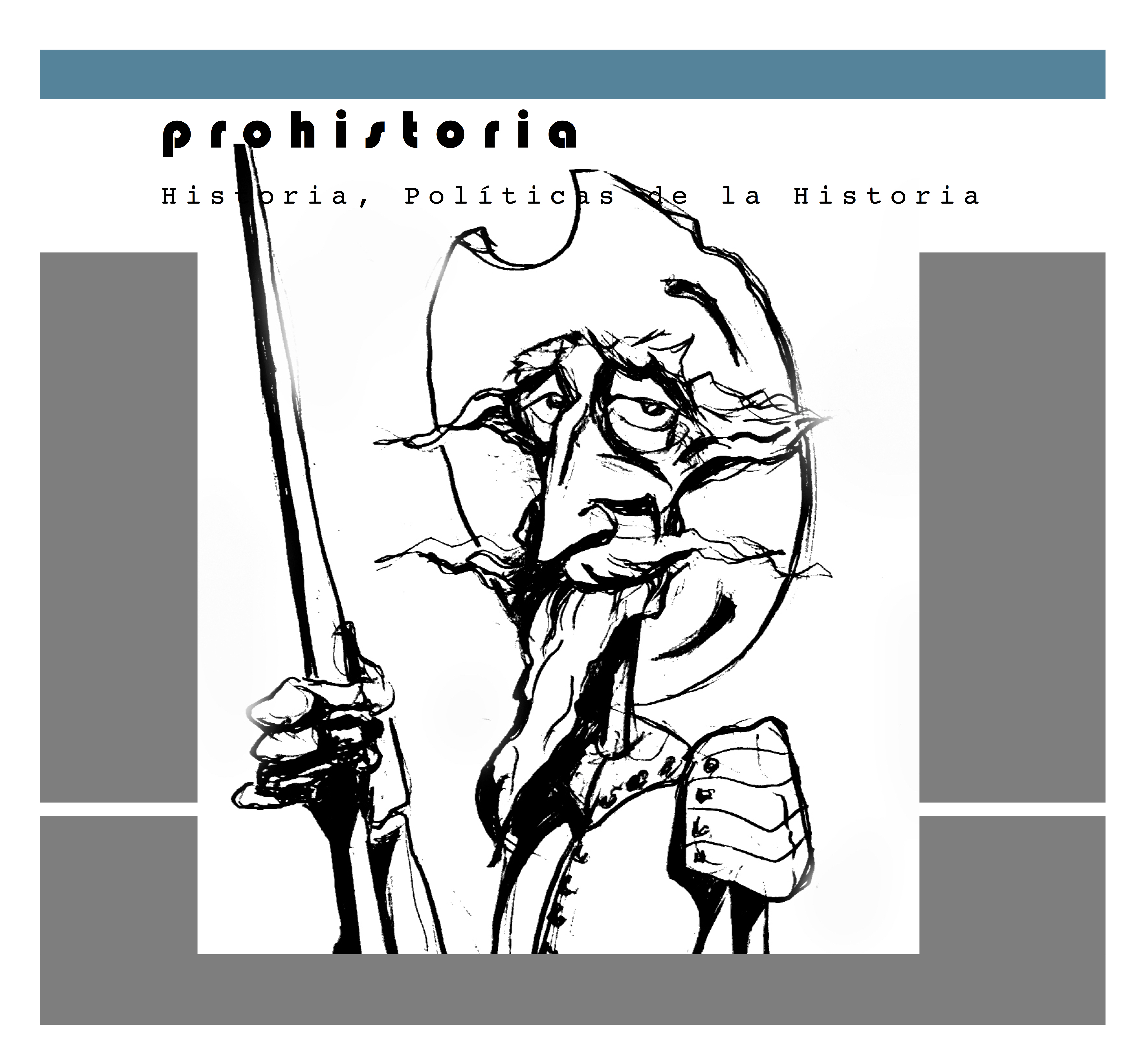Public Letters
Methodological Keys and Possible Historical Uses
DOI:
https://doi.org/10.35305/prohistoria.vi31.1151Keywords:
Public Letters, State, History from Below, Egodocuments, MethodologyAbstract
The emergence of a new “history from below”, more concerned with the subjective universe of ordinary people, has prompted a review of the analytical possibilities of egodocuments as sources capable of revealing, deliberately or accidentally, the life of the individuals of the past. Within this universe, in this article we explore the analytical possibilities of public letters, pieces of correspondence that individuals sent to political leaders and state agencies during the first half of the twentieth century and that we consider valuable ways to investigate the material, symbolic, political and social conditions of their authors and recipients.
Downloads
References
LYONS, Martyn La cultura escrita de la gente común en Europa, c. 1860-1920, Ampersand, Buenos Aires, 2016 [2013]
STOTSKY, Sandra “Writing in a Political Context. The Value of Letters to Legislators”, en Written Comunication, vol. 4, núm. 4, 1987, pp. 394-410
DUIN, Ann Hill y HANSEN, Craig J. (ed.) Nonacademic writing. Social theory and Technology, Lawrence Erlbaum Associates, Publishers, Mahwah, New Jersey, 1995
BARTON, David y HALL, Nigel “Introduction”, en Letter Writing as a Social Practice, John Benjamins Publishing Company, Amsterdam/Philadelphia, 1999
HITCHCOCK, Tim; KING, Peter and SHARPE, Pamela (ed.) Chronicling Poverty: The Voices and Strategies of the English Poor, 1640-1840, Palgrave Macmillan, London, 1997
GESTRICH, Andreas; HURREN, Elizabeth and KING, Steven (eds.) Poverty and Sickness in Modern Europe. Narratives of the Sick Poor, 1780-1938, Continuum, London and New York, 2012
ABOY, Rosa “El ʻderecho a la viviendaʼ. Opiniones y demandas sociales en el primer peronismo”, Desarrollo Económico, vol. 44, núm. 174, 2004, pp. 289-306
ELENA, Eduardo “What the People Want: State Planning and Political Participation in Peronist Argentina, 1946-1955”, Journal of Latin American Studies, vol. 37, 2005, pp. 81-108
Dignifying Argentina. Peronism, Citizenship and Mass Consumption, University of Pittsburgh Press, Pittsburgh, 2011
MORENO, José Luis y CACOPARDO, María Cristina “Familia, pobreza y desamparo antes y durante el primer gobierno peronista, 1935-1955”, Población & Sociedad, núm. 12/13, 2005/2006, pp. 91-131
GUY, Donna Women Build the Welfare State. Performing Charity and Creating Rights in Argentina, 1880-1955, Duke University Press, Durham and London, 2009
ÁLVAREZ, Adriana; MOLINARI, Irene y REYNOSO, Daniel (ed.) Historia de enfermedades, salud y medicina, UNMdP, Mar del Plata, 2004
ACHA, Omar “Sociedad civil y sociedad política durante el primer peronismo”, Desarrollo Económico, vol. 44, núm. 174, 2004, pp. 199-230
Cartas de amor en la Argentina peronista: construcciones epistolares del sí mismos, del sentimiento y del lazo político populista”, Nuevos mundos mundos nuevos, URL: http://nuevomundo.revues.org/12272, consultado 9/10/17
Crónica sentimental de la Argentina peronista: sexo, inconsciente e ideología, 1945-1955, Prometeo, Buenos Aires, 2008
GUY, Donna La construcción del carisma peronista. Cartas a Juan y Eva Perón, Biblos, Buenos Aires, 2017
VARGAS, Mercedes “Primer Peronismo y subjetividad política en Santiago del Estero. Apuntes para nuevas lecturas extracéntricas”, Identidades, núm. 5, 2013, pp. 84-105
BARROS, Mercedes - MORALES, Virginia - REYNARES, Juan Manuel y VARGAS, Mercedes “Las huellas de un sujeto en las cartas a Perón: entre las fuentes y la interpretación del Primer Peronismo”, Revista Electrónica de Fuentes y Archivos, núm. 7, 2016, pp. 234-260
ZEMON DAVIES, Natalie Fiction in the Achives. Pardon Tales and their Tellers in Sixteenth-Century France, Stanford University Press, California, 1987
SOKOLL, Thomas “Negotiating a Living: Essex Pauper Letters from London, 1800-1834”, International Review of Social History, vol. 45, 2000, pp. 19-46
GESTRICH, Andreas - KING, Steven and RAPHAEL, Lutz Being Poor in Modern Europe. Historical Perspectives 1800-1940, Peter Lang, Berna, 2006
KING, Steven “Regional Patterns in the Experiences and Treatment of the Sick Poor, 1800-40: Rights, Obligations and Duties in the Rhetoric of Paupers”, Family & Community History, vol. 10, núm. 1, 2007, pp. 61-75
Pauper Letters as a Source”, Family & Community History, vol. 10, núm. 2, 2007, pp. 168-170
SUSSMAN, Leila A. Dear FDR. A study of political Letter-Writing, The Bedminster Press, New Jersey, 1963
FITZPATRICK, Sheila “Editor´s Introduction: Petitions and Denunciations in Russian and Soviet History”, Russian History/Histoire Russe, vol. 24, núms. 1-2, 1997, pp. 1-9
PYLE, Emily E. “Peasant Strategies for Obtaining State Aid: a Study of Petitions during World War I”, Russian History/Histoire Russe, vol. 24, núm. 1-2, 1997, pp. 41-64
EBERLE, Henrik (ed.) Letters to Hitler, Polity Press, Cambridge, 2007;
CARZOLA SÁNCHEZ, Antonio Cartas a Franco de los españoles de a pie (1936-1945), RBA, Barcelona, 2014
LENOE, Matthew E. “Letter-Writing and the State. Reader Correspondence with Newspapers as a Source for Early Soviet History”, Cahiers du Monde Russe, vol. 40, núm. 1-2, 1999
CASTILLO GÓMEZ Antonio (ed.) Cultura escrita y clases subalternas: una mirada española, Sendoa, España, 2001
LYONS, Martin (ed.), Ordinary Writings, personal narratives: Writing Practices in 19th and early 20th century Europe, Peter Lang, Bern, 2007
WILLEMIJN, Ruberg “Introduction”, en Egodocuments and History Series, Volume 4: Conventional Correspondence: Epistolary Culture of the Dutch Elite, 1770-1850, NLD: Brill, Leiden, 2011
FARGE, Arlette La atracción del Archivo, Edicions Alfons El Magnánim, Valencia, 1991
LYONS, Martyn “The Power of the Scribe: Delegated Writing in Modern Europe”, European History Quaterly, vol. 44, núm. 2, 2014, pp. 244-262
JESEN, Silvina y MORENO MONTERO, María “La escritura epistolar como registro de la experiencia de encierro y represión en las cárceles argentinas (1974-1983)”, Historia Actual Online, núm. 31, pp. 143-157
DOLL CASTILLO, Darcie “La carta privada como práctica discursiva. Algunos rasgos característicos”, Revista Signos, núm. 35, 2002
FITZPATRICK, Sheila “Supplicants and Citizens: Public Letter-Writing in Soviet Russia in the 1930s”, Slavic Review, vol. 55, núm. 1, 1996
GOFFMAN, Erving La presentación de la persona en la vida cotidiana, Amorrortu, Buenos Aires, 1989 [1959]
ABAD MERINO, Mercedes “’Muy señor mío, dueño y amigo’. Lengua epistolar y elite social en la correspondencia privada del sureste español (1760-1805)”, Tonos digital: Revista electrónica de estudios filológicos, núm. 30, 2016
SCOTT, James Los dominados y el arte de la resistencia. Discursos ocultos, Era, México, 2000 [1990]
THOMPSON, Edward Palmer “Patricios y plebeyos”, en Costumbres en común, Crítica, Barcelona, 1995 [1991]
LYONS, Martyn “Writing Upwards: How the Weak Wrote to the Powerful”, Journal of Social History, vol. 49, núm. 2, 2015, pp. 1-14
HARRIS, Tim (ed.) The Politics of the excluded, c. 1500-1850, Palgrave, New York, 2001
HEERMA VAN VOSS, L. (ed.) Petitions in Social History, International Review of Social History, Supplement 9, 2001
KERBRAT-ORECCHIONI, Catherine La enunciación de la subjetividad en el lenguaje, Edicial, Buenos Aires, 1997 [1980]
BOURDIEU, Pierre Sobre el Estado. Cursos en el Collège de France (1989-1992), Anagrama, Buenos Aires, 2014 [2012].
LAGOS, María L. y CALLA, Pamela (comp.) Antropología del Estado. Dominación y prácticas contestatarias en América Latina, INDH/PNUD, La Paz, 2007 [1994]
Published
How to Cite
Issue
Section
License

This work is licensed under a Creative Commons Attribution-NonCommercial-ShareAlike 4.0 International License.
- Authors retain copyright and grant the journal right of first publication with the work simultaneously licensed under Creative Commons Attribution 4.0 International License.
- Authors are able to enter into separate, additional contractual arrangements for the non-exclusive distribution of the journal's published version of the work (e.g., post it to an institutional repository or publish it in a book), with an acknowledgement of its initial publication in this journal.
Copyright of this issue © Prohistoria. Historia, políticas de la historia



















